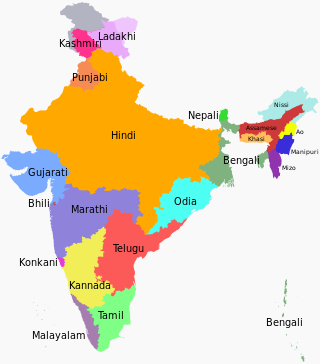
As of 2024, 22 languages have been classified as recognised languages under the Eighth Schedule to the Constitution of India. There is no designated national language of India.

Maulana Azad National Urdu University is a Central University located in the city of Hyderabad in the Indian state of Telangana. It was named after Maulana Abul Kalam Azad, India's first Minister of Education, a freedom fighter in India's struggle for independence, and a scholar of Islam and Urdu literature. It was the only Urdu university in India until the Dr. Abdul Haq Urdu University was established in Kurnool, Andhra Pradesh in 2016.

From a historical perspective, Professor Ishtiaq Ahmed of the University of Stockholm and Professor Shamsul Islam of the University of Delhi classified the Muslims of Colonial India into two categories during the era of the Indian independence movement: nationalist Muslims and Muslim nationalists. The All India Azad Muslim Conference represented nationalist Muslims, while the All-India Muslim League represented the Muslim nationalists. One such popular debate was the Madani–Iqbal debate.

Maulana Azad National Institute of Technology Bhopal is a public technical university located in Bhopal, Madhya Pradesh, India. It is part of a group of publicly funded institutions in India known as National Institutes of Technology. It is named after the Independent India's first Minister of Education (India), scholar and independence activist Abul Kalam Azad who is commonly remembered as Maulana Azad.
Azeez Sait was an Indian politician who served as the Minister of State for Transport, Tourism, Labour Wakf Department and Industries and Commerce of Karnataka from 1972 to 1984. A prominent minority leader of the Congress Party, he represented the Narasimharaja constituency in the legislative assembly a record six times between 1967 and his death in 2001.

The Ministry of Tribal Affairs (MOTA) is an Indian Government ministry charged with overall development of Scheduled Tribe communities of India by providing them education, scholarships, grants to create more health infrastructure in tribal communities, preservation of Tribal Culture & languages and direct cash transfer schemes to economically backward tribal families.

K. Rahman Khan is a Veteran Politician belonging to the Indian National Congress and a former Union Minister of Minority Affairs and also Ex-Deputy Chairman of Rajya Sabha.

The Union Government set up the National Commission for Minorities (NCM) under the National Commission for Minorities Act, 1992. Six religious communities, viz; Muslims, Christians, Jains, Sikhs, Buddhists and Zoroastrians (Parsis) have been notified in Gazette of India as minority communities by the Union Government all over India. Original notification of 1993 was for five religious communities; Sikhs, Buddhists, Parsis, Christians and Muslims, later in 2014, Jains community was also added. As per Census 2001, these six communities consists of 18.8% of the country's population.
Prime Minister’s New 15 point Programme for minorities is a programme launched by Indian government for welfare of religious minorities in furtherance of reports by committees such as the Sachar Committee Report that highlighted that minorities, especially Muslims, in the country were often in a worse socio-economic and political condition than communities such as the Scheduled Casts and Scheduled tribes communities that have been oppressed over millennia through the caste system. It pegged the status of minorities on various indicators such as nutrition, health, education et al. of minorities and specially Muslims at an abysmally poor level. The 15 point program was the government's response to these finding by laying down guidelines to target minorities in schemes and entitlements that are already in place and designing and executing new schemes aimed at the empowerment of these groups. The programme advocated allocating 15% of plan outlays of welfare schemes identified under the 15 point programme. Mainly, issues of education, credit, housing, employment and communal harmony fall under its ambit.

Hanswar is a village in the Ambedkar Nagar district of Uttar Pradesh, India, located east of Tanda. Demographically, Hanswar resembles the rest of the Purvanchal area in which it is located.

The Ministry of Social Justice and Empowerment is a Government of India ministry. It is responsible for welfare, social justice and empowerment of disadvantaged and marginalised sections of society, including scheduled castes (SC), Other Backward Classes (OBC), LGBT people, the disabled, the elderly, and the victims of drug abuse. It also helps in the enforcement of legislation with regards to these marginalized groups to better enforce anti-discrimination policies.

The Ministry of Youth Affairs and Sports is a branch of the Government of India which administers the Department of Youth Affairs and the Department of Sports in India. Mansukh Mandaviya is the current Minister of Youth Affairs and Sports followed by his Deputy Raksha Khadse
Telangana State Wakf Board, is a constituted Board established by the 1954 Central Act to manage, regulate and protect the exclusive affairs of Muslim endowment (Wakf) properties, Wakf institutions and Marriage Records of the Muslim community of Telangana, India. It is generally known and writes under the name and style of Muslim Wakf Board.
National Minorities Development and Finance Corporation (NMDFC) was incorporated in September 1994 as a non profit company under Ministry of Social Justice and Empowerment, Government of India to provide concessional finance for self-employment activities to eligible beneficiaries belonging to the minority communities, having a family income below double the poverty line.
Maulana Azad Education Foundation is a governmental organization established to promote education amongst educationally backward sections of the Muslim community of India. It is funded by the Ministry of Minority Affairs, Govt. of India. The Minister of Minority Affairs is ex-officio president of the foundation. The foundation was established on the occasion of Maulana Abul Kalam Azad's birth centenary celebrations in 1989.

Maulana Abul Kalam Azad University of Technology, West Bengal, formerly known as West Bengal University of Technology (WBUT) is a public state university located in Haringhata, West Bengal, India. Established in 2001 by the West Bengal legislature, it is fully funded by the Government of West Bengal. The university provides management and engineering degrees through affiliated colleges and in-house departments.
Mehmood-ur Rehman was an Indian civil servant, best known as the chairman of the 2008 Committee on Socio-Economic Backwardness of Muslims in Maharashtra. He was Vice-Chancellor of Aligarh Muslim University from 1995 to 2000 and served as the chairman of Bombay Mercantile Cooperative Bank.
The Uttar Pradesh Sunni Central Waqf Board is a body constituted under The Wakf Act, 1995 of the Government of India, for general superintendence of the affairs of Sunni Muslim waqf (charity) properties, waqf institutions of the Sunni Muslim community of the state of Uttar Pradesh in India. Its chairman is Zufar Ahmad Faruqi. The Sunni Waqf Board has been the main Muslim litigant in the Babri Masjid–Ram Janmabhoomi title dispute.
After completing a postgraduate degree, one of the options is to pursue a Doctor of Philosophy (Ph.D) program. These Ph.D programs cost money and time. To help a scholar there are many Research Fellowship Schemes in India funded by either a government agency or a private one. Such a scholar pursuing a Ph.D receives a monthly stipend and in some cases an annual contingency grant for 2 to 5 years.
Delhi Waqf Board is a state level statuary body under the Delhi Government under Wakf Act 1954. It exercises control over mosques, graveyards and religious waqfs. The primary function of Wakf Board is to insure its properties and revenue are appropriately managed and utilized.
























